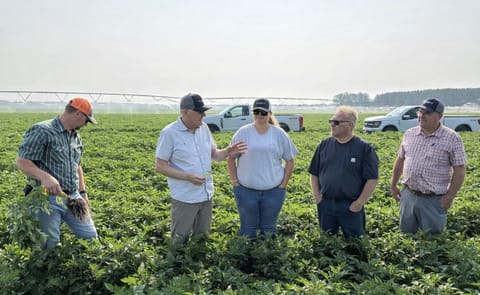Using gene editing technology such as CRISPR-Cas9, bruising and browning of potatoes can be reduced, eliminating some of the 3.6 billion lbs. of potato food waste each year.
Solapas principales
Potato Processing company J.R. Simplot acquires license for CRISPR-CAS9 gene editing technology

The J.R. Simplot Company announced today that it has executed a joint intellectual property licensing agreement with Corteva Agriscience™, Agriculture Division of DowDuPont, and the Broad Institute of MIT and Harvard for foundational CRISPR-Cas9 and related gene editing tools.
The technology provides Simplot with another avenue to bring desirable traits forward in certain fruits and vegetables and advance products to the market in the United States to benefit both farmers and consumers.
Simplot provides a full line of fresh, frozen and chilled offerings that include potatoes, avocados and strawberries.
Using gene editing technology such as CRISPR-Cas9, bruising and browning of potatoes can be reduced, eliminating some of the 3.6 billion lbs. of potato food waste each year.
Each year, 35 percent of fresh potatoes worth $1.7 billion are lost because of waste from poor storage or shelf life according to the Journal of Consumer Affairs. Avocados, strawberries and other fruits and vegetables have similar losses and gene editing technology like CRISPR-Cas9 genome editing tools may be able to reduce that significantly.
Susan Collinge PhD, Vice President of Simplot Plant Sciences:
“We're excited to add CRISPR-Cas9 technology to our platform of tools aimed at providing more sustainable produce for the industry.”
“These pioneering tools may enable growers to achieve higher yields on less land resulting in fewer pesticides, water and labor needs while extending the quality of a consumer's favorite foods.”
Comprehensive intellectual property rights allow entities to apply scientific tools as widely as possible. To enable such access, Corteva Agriscience™ and Broad Institute have agreed on a joint non-exclusive licensing framework for agricultural use. The license to Simplot represents the first time that Corteva Agriscience™ and Broad Institute have jointly provided a license of CRISPR-Cas9 genome editing tools to an agricultural company.
Neal Gutterson, Chief Technology Officer at Corteva Agriscience™:
“We applaud Simplot for taking the initiative to broaden their portfolio of food technologies to further enhance sustainability and reduce food waste.”
“CRISPR-Cas9 offers farmers and consumers so many great benefits. It's exciting to see a company with such a strong innovation track record putting CRISPR-Cas9 to work.”
Simplot is one of the largest potato processors in North America and processes a variety of fruits and vegetables around the world. Using different genetic techniques, the company previously commercialized two generations of its Innate®-branded line of potato varieties by adapting genes only from wild and cultivated potatoes. The potatoes feature reduced bruising and black spots, reduced natural asparagine and protection from late blight pathogens.
Issi Rozen, Chief Business Officer of the Broad Institute:
“Our goal is to maximize the scientific impact of CRISPR-Cas9 for improving agriculture, and our joint licensing agreement offers the opportunity to provide much broader access to help researchers reduce food waste, limit pesticides, and improve drought resistance, while promoting safe and ethical uses of groundbreaking technologies.”
The U.S. Department of Agriculture (USDA) recently issued a statement providing clarification on plants produced through innovative new breeding techniques which include CRISPR-Cas9 genome editing techniques. Under its biotechnology regulations, USDA does not regulate or have any plans to regulate plants that could otherwise have been developed through traditional breeding techniques as long as they are not plant pests or developed using plant pests.
Learn more about CRISPR-Cas9 applications in agriculture at https://crisprcas.pioneer.com.
Learn more about the Broad Institute's efforts to offer CRISPR tools for agriculture at https://www.broadinstitute.org/.











